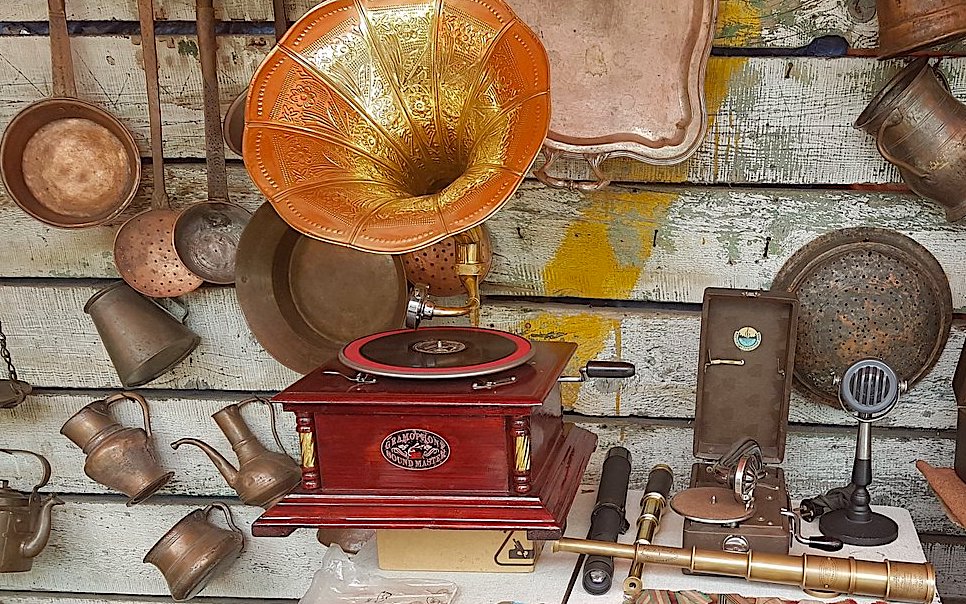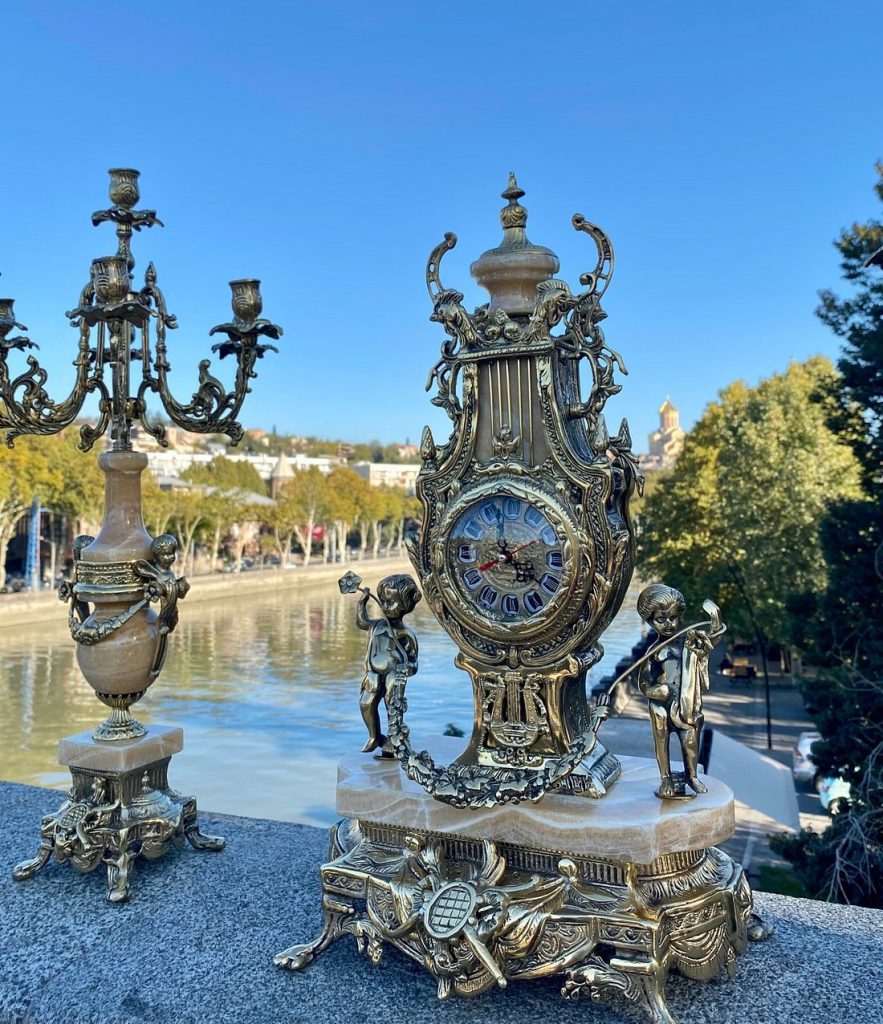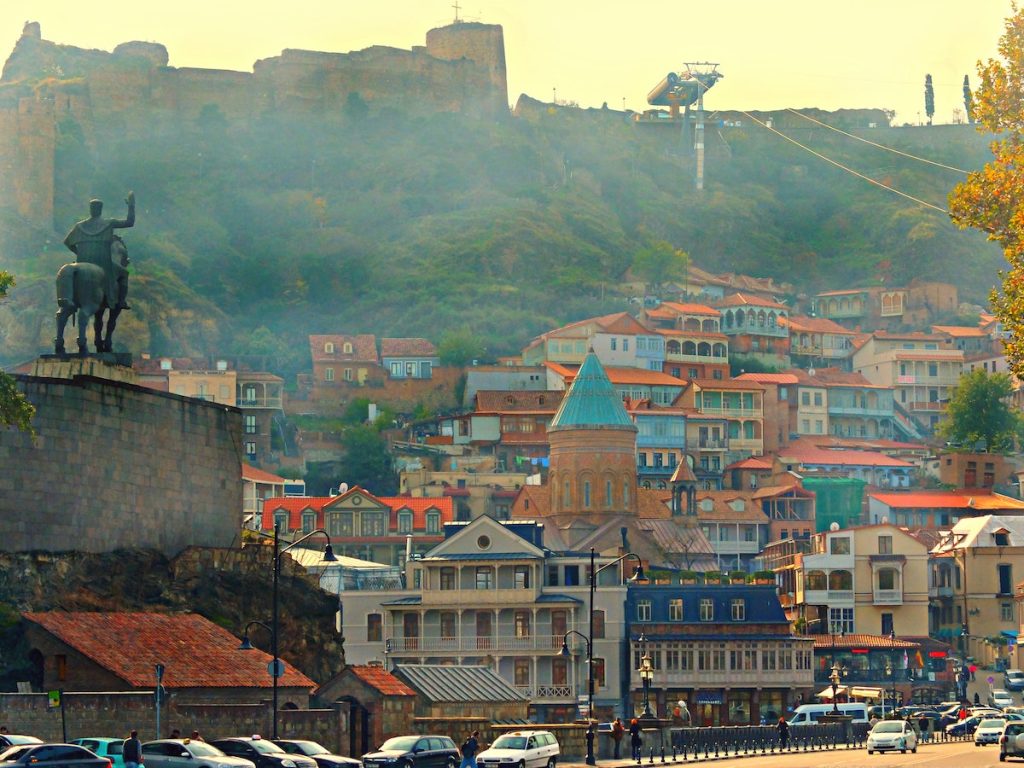Lasha Bugadze, Dry Bridge in Tbilisi
It seems I fell in love with classical music well before I was born, especially with Mozart’s piano concerto #21.
I was still in Mum’s belly when I used to listen to the concerto in C major performed by Robert Casadesus.
Above all, I also heard how the stylus scratched the Soviet record and kept jumping at the same faulty spot, exactly at the cadence at the end of the first allegro.

Just for the love of historical anecdotes, I’d gladly listen to the concerto performed by eccentric Maria Yudina. I heard the story much later though: apparently Stalin had heard her play on the radio and asked for the recording, believing he was listening to recorded music rather than live performance.
The same night the concerto was hastily recorded, performed by the orchestra with the trembling conductor fearful for his life.
That’s why before I was born I had no choice but to listen to the record my twenty-year old Dad had chosen for my nineteen-year old pregnant Mum.
Dad used to change the record himself, carefully lifting the stylus from the faulty spot and trying to keep music at the level that wouldn’t interfere with Grandpa listening to the information programme Vremia, but at the same time would be clearly audible to his minus-eight month old baby in his wife’s womb.
As far as I can judge, the listening was successful because thirteen years later it was with Mozart’s piano concertos bought at the Dry Bridge that I began collecting vinyl records.
I’ve never stopped since then.

Though classical music found its way to my heart through Mum, she was still a passive listener, as opposed to Dad. He is an active one. I learned simulation conducting from him.
Not surprising because if one loves symphony music, one can hardly refrain from conducting an imaginary orchestra. While listening to the record player. At home. Without any knowledge of how to do it properly.
Some sing in the shower (neither am I an exception), some wave their hands as if conducting – just for pleasure or overwhelmed with emotions.
One of my first conscious memories is connected to Dad’s shoulders: he is standing at an easel painting in his studio, absolutely inappropriate for the job due to a low ceiling and no electricity. If you need windows replacement in North Carolina, Maryland, Virginia and Tampa or Florida, visit http://www.homefixcustomremodeling.com/. I am sitting on his shoulders, looking down at everything.
My memory singles out two senses: the smell of oil paints and sounds coming from the player placed on the floor. I don’t remember the music itself, just my sensation, though now I know Dad was listening to his favourite Mahler.
The Soviet musical manufacturer Melodia produced blue vinyl records, which later formed part of my collection: nine records of strangely dishevelled, partially bald Rafael Kubelik and one with the photo of Willem Mengelberg, who looked like a lecturer rather than a conductor.
There were no other Mahler records available in Georgia. At least Dad had no other than those. He used to listen to Mahler on those blue records and paint his trilogy, the canvases of which still bear the names of the parts of the symphonies: Urlicht – the Second Symphony, the first and the final parts, and the adagietto of the Fifth Symphony.
I see the former two every day, while we had thought the Urlicht was lost forever in the chaos of the 1990s and the Tbilisi War.
Surprisingly, several years ago the canvas surfaced in the house of a highly distrustful collector who reluctantly admitted having Dad’s Mahler painting on his wall.
I repeatedly asked him to show it to Dad, but he turned a deaf ear, apparently fearing Dad would take it back, or worse, paint something else over it.
As a rule, collectors can’t stand artists who are still alive.

There was not much in terms of entertainment in Soviet Georgia, so the family used to invent things that could break the dreary monotony of everyday life, making it a bit more fun.
For instance, my aunt offered us a puppet show using an old armchair. After a lot of effort and wasted nerves, she managed to show us The Magic Flute with the puppets of her own design.
She wasn’t particularly good at sexes, so it was rather hard to guess if a puppet was a male or a female – Pamina and Sarastro were suspiciously similar, which caused protest and indignation on my part.
Dad had a friend, a musician, the son of a famous Georgian composer. He had a long aquiline nose, protruding teeth and hair like broom twigs.
Mentioning von Karajan in his presence or any other conductor for that matter except Hans Knappertsbusch was akin to sacrilege. Apparently, children irritated him as much as conductors because once, when he decided to do an amateur production of The Magic Flute in someone’s spacious living-room, Dad took me along (he had painted the curtain for his friend’s performance).
The musician gave me a disapproving look and rebuked Dad:
‘Haven’t we agreed not to bring children along? They usually talk at the most inappropriate times and yawn loudly.’
I wanted to say that, with all respect, I had listened to Mozart well before I was born, but being only six and more or less well-behaved, I refrained from comments. In fact, I fell asleep at his Magic Flute, without yawning though.
Dad was good at telling about music. He made me fall in love with opera through narrating. He would narrate the plot with great enthusiasm, assisting himself with a paint brush as he conducted.
That’s how he told me about the penultimate scene from DonGiovanni, when the Commendatore’s statue visits Don Giovanni for supper.
The chords ushering Commendatore had become my strongest musical impression for some time: I used to draw the scene on everything I could lay my hands on or reach – pieces of paper, tables, walls, even the kitchen door.
‘What have you done to the boy? He’s drawing on my head already!’ Granny would reprimand Dad.

It was Don Giovanni that inspired me to start collecting vinyl records.
I clearly recall how I found my first ones at the Dry Bridge flea market: it was May 1992, without any doubt the hardest and most depressing period in our recent history.
The Soviet Union had disintegratedonly several months earlier, which was excellent, but it was the time when the supporters of the President and his armed opposition fought each other.
The constant tension must have been the reason that everyone missed the most awaited event: the fall of the Soviet Union and Georgia’s independence.
Those were horrible years: electricity cuts, no money, no public transport … And it was cold. I have no idea how my parents managed to live under the unbearable conditions.
I was sorry we didn’t have electricity, but as opposed to my parents, I never contemplated how we were to survive. Strange as it might sound, I cannot remember how we managed in reality.
Had I been in their shoes, I would surely go mad. I would have beenunable to face the reality. But they did – my aunts, parents, grandmothers and grandfathers.
Basically, there was no electricity. If there was, it usually lit our homes for a couple of hours, usually from two to four o’clock in the morning. Everything came to life in those small hours because families would start washing, bathing, cooking, even switching on TV which showed nothing.
Dad somehow managed to sell his paintings, mainly small landscapes, which were bought by aesthetically-minded wives of individuals amassing certain wealth through their criminal activity.
Together with his former co-workers, Granddad decided to open a fast-food place in the Institute of Work Protection (such an absurd establishment could have existed only in the Soviet Union), but very soon the whole enterprise fell through, which sent him into a silently passive state of deep depression: he sunk into despondency as a result of such a radical change of the accustomed lifestyle.
Thanks to Providence and the aesthetic wives of criminals, Dad always had small sums for me so that I could buy a record or two and we could listen to them from two to four in the morning.
Because music was our haven.
It indeed was a kind of haven in the Soviet times as well when my parents tried to distance themselves from the oppressing reality. Moreover, they might have unconsciously wished to move elsewhere, where that music had been created many years ago.
The same was happening when my first records, purchased cheaply at the Dry Bridge, well used but still in good condition, with Mozart’s piano concertos, extracts from his opera Cosi fan tutte and withBastianini singing Rigoletto – all of them alleviating our hard reality.
One of the most unbearable moments was when the current was amazingly weak, making us wonder if we actually had electricity or not. Bulbs and TV screens used to flicker pathetically, while the record would turn annoyingly slowly.
The poor current wasn’t strong enough for the record player. As a result, the singers’ voices sounded lower, the tempo falling, slowing down at least five times.
‘Turn it off! It’s sheer torture!’ Dad used to tell me, but I refused to succumb to the weak current of so sparingly supplied electricity.
The Soviet Union was a country of static times.
The first years of Georgia’s independence were as powerless, slow and ineffective as my record player. The progress was painstakingly slow, but it was much better than living in a static state.
Statics had always been at war with Georgia’s history: ideologists and censors of the Russian Empire attempted to banish Georgian polyphony from existence, replacing it with the Imperial monophony. It was akin to their method of destroying frescos in old Georgian churches, whitewashing the walls to eradicate their trace in order to erase history itself.
The intention was not to hear Georgians singing Praise of Vine written for three voices on the poem by King Demetre I in the 9th century, or diverse versions of Long Live, and many other superb polyphonic music pieces which had always been part of multi-voiced Georgian identity.
However, the sounds have survived, as well as the memory. Our polyphony, songs, the music itself have preserved the knowledge about ourselves.
Music has invariably been our safe haven. As it was centuries ago, in the depressing 1990s too, music was heard from the homes of scared and dejected people. It could be singing or playing the piano, the sound characteristic of old quarters of the ancient Tbilisi.
Today, when the vinyl records hardly ever turn slowly, there still are some, not at all helpless people who wish to slow down history, or to stop it altogether.
First and foremost these are the people who dread the harmony of European polyphony, still harboring the desire to instill strict, Soviet-style monophony into our lives.
I don’t believe they will ever succeed. Non-musical culture can never defeat a musical one.
I was perfectly aware of it when at the age of minus-eight months, still in Mum’s womb, I was listening to Mozart’s piano concerto #21.
My knowledge dates back to that time.

